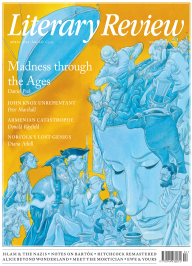Patricia Fara
God in the Machine
To Explain the World: The Discovery of Modern Science
By Steven Weinberg
Allen Lane 416pp £20
The eminent theoretical physicist and Nobel Laureate Steven Weinberg has written several acclaimed books on the origins of the cosmos, but now he has ventured into the foreign country of human history. Defiantly rejecting historians’ shibboleths (his term, not mine), he declares that modern science was not invented, nor did it develop in different cultures over a long period of time; rather, science is a technique that works and has been lying around waiting to be discovered. Weinberg reveals that, as a practising scientist, he has a vested interest in showing how his own research fits into a grand tradition stretching back over many centuries – and he candidly admits that he has no qualms about narrating a story of science based on his personal opinions. He certainly lives up to that promise by passing some brisk judgements: Aristotle, he pronounces, can be tedious and wrong, but at least he is not silly, like Plato.
Weinberg tells a linear story of progress with a straightforward plot: understanding grows when mathematics is introduced and religion is eliminated. That is a message many scientists like to hear, and they will also appreciate the last quarter of his book, which is devoted to ‘Technical Notes’ (Weinberg pays little

Sign Up to our newsletter
Receive free articles, highlights from the archive, news, details of prizes, and much more.@Lit_Review
Follow Literary Review on Twitter
Twitter Feed
It wasn’t until 1825 that Pepys’s diary became available for the first time. How it was eventually decrypted and published is a story of subterfuge and duplicity.
Kate Loveman tells the tale.
Kate Loveman - Publishing Pepys
Kate Loveman: Publishing Pepys
literaryreview.co.uk
Arthur Christopher Benson was a pillar of the Edwardian establishment. He was supremely well connected. As his newly published diaries reveal, he was also riotously indiscreet.
Piers Brendon compares Benson’s journals to others from the 20th century.
Piers Brendon - Land of Dopes & Tories
Piers Brendon: Land of Dopes & Tories - The Benson Diaries: Selections from the Diary of Arthur Christopher Benson by Eamon Duffy & Ronald Hyam (edd)
literaryreview.co.uk
Of the siblings Gwen and Augustus John, it is Augustus who has commanded most attention from collectors and connoisseurs.
Was he really the finer artist, asks Tanya Harrod, or is it time Gwen emerged from her brother’s shadow?
Tanya Harrod - Cut from the Same Canvas
Tanya Harrod: Cut from the Same Canvas - Artists, Siblings, Visionaries: The Lives and Loves of Gwen and Augustus John by Judith Mackrell
literaryreview.co.uk